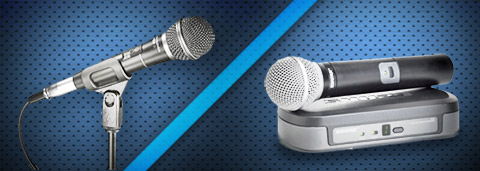This question comes up a lot in ministry: Do we go wired or wireless? Honestly, neither option is without its flaws, and your church needs to weigh the options. However, I hope that this explanation of the advantages and disadvantages of both will help you decide which is better for your ministry.
Microphone Showdown – Wireless VS Wired Mics
Wireless — Advantages
The biggest advantage? Freedom! Any vocalist or public speaker will tell you this. The ability to walk anywhere and move without feeling like you’re tethered down simply can’t be beat. Some have even said that raising their hands while holding a cable has hindered their ability to worship. Wireless microphones also make everything look much cleaner. The fewer cables that are visible, the better. Not to mention, wireless saves setup time for the audio guy. No more running cables every week! Wireless mics give pastors the ability to walk on stage, walk around the stage, and walk off the stage without having to fumble with cables. It’s complete freedom.
Wireless — Disadvantages
Going wireless is costly. A wireless microphone can cost anywhere from $200 to $2,000. Add in that they run off of battery power, and there’s another ongoing expense to consider. Wireless microphones can also have interference issues depending on the environment they are used in.
Another major disadvantage to wireless mics is that since you’re operating in a public radio frequency, there is the possibility that the government could acquire the frequency spectrum that you occupy, and reallocate it. This actually happened a few years back. Most churches (including my own) had wireless microphones that broadcast in the 700MHz band, but the FCC reallocated that band for public safety groups like firefighters and police. All of a sudden, it was illegal for our church to use those microphones anymore. We had to buy all new mics in a lower frequency range or face a very hefty fine. While the FCC has not stated further intentions, there is a fear in the audio/visual community that this could happen again.
Wired — Advantages
You’ll definitely get better bang for your buck. I could spend $500 on a wireless package, and what I’m purchasing is the technology of sending and receiving the audio signal, not the microphone quality. But with the same money I could get a $20 microphone cable and have the other $480 to spend on a really nice microphone that sounds amazing. Plus, I don’t  have to spend money on batteries to power them. It just makes it easier on the church budget. Wired microphones are stable, and can provide peace of mind. You never have to worry about wireless interference or the FCC telling you can’t use them anymore. Some audio engineers believe that when the signal is unbroken — going from the mic to the console directly by a cable — it sounds better than if you had that same mic set up wirelessly.
have to spend money on batteries to power them. It just makes it easier on the church budget. Wired microphones are stable, and can provide peace of mind. You never have to worry about wireless interference or the FCC telling you can’t use them anymore. Some audio engineers believe that when the signal is unbroken — going from the mic to the console directly by a cable — it sounds better than if you had that same mic set up wirelessly.
Wired — Disadvantages
Remember that tether? That feeling of being chained down? That’s not easy to get over for some people. There are some vocalists who, once they’ve gone wireless, have tasted the freedom and refuse to go back. Once you factor in all the hassle — visual clutter, setup time, and trip hazards — wired is not always the best option.
How do I do it?
Personally, I give my vocalists and pastors wireless mics so they can have the freedom they desire. However, anyone else who doesn’t hold the mic gets to be wired. For example, when the worship leader is playing piano or guitar, their mic is wired. Electric guitarists, bassists, or piano players who are singing backups will also get wired mics. I feel this is the ideal setup for our ministry, because I get the best sounds from those who won’t feel the cable. On the other hand, the people who do go wireless will feel free to lift their hands in worship without feeling chained down.
What does your church use? Wireless or wired? Let us know in the comments below!

